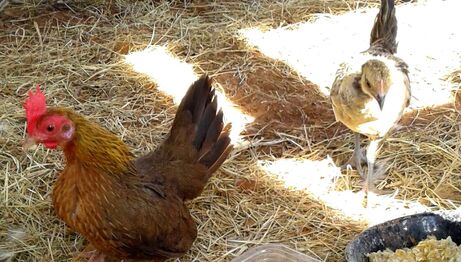 Protein needs in chickens. Bonnie and Angelina-Rescued Bantams at CHOE.
Protein needs in chickens. Bonnie and Angelina-Rescued Bantams at CHOE.
The following are the minimum protein needs for broiler chickens, pullets, and laying hens. If you are feeding your chickens commercial feed it is important that you get the right kind of feed for your chickens. Additional grains are not needed if using commercial feeds labeled complete and balanced. It is a good idea to check your chicken feed ingredients label or contact the manufacturer to get a complete list of ingredients and amounts that are in the feed you are using. Adding grains to the commercial feed can upset the nutritional balance. Different chickens have different nutritional needs. If you are making your own feed or planning on selling chicken feed you need to make sure that you provide the proper amount of proteins in the feed.
Broiler Chickens (Meat birds):
Starter (0-6 weeks)-23%
Finisher (6 weeks)- 10%
Baby Chicks/Pullets:
Starter (0-8 weeks) - 20%
Developer (8-20 weeks)- 14%
Egg Laying Hens:
Laying Hens Layer-16%
Starter (0-6 weeks)-23%
Finisher (6 weeks)- 10%
Baby Chicks/Pullets:
Starter (0-8 weeks) - 20%
Developer (8-20 weeks)- 14%
Egg Laying Hens:
Laying Hens Layer-16%
Protein Rich Foods For Chickens Who are moulting
When your chickens are molting (usually in the Fall season) you may want to provide them with a feed with a higher protein level (20% rather than the normal 16% for laying hens). A protein supplement can help their new feather growth but is not a must have. It's your choice. I like to give my laying hens protein rich treats during the winter when they do not have access to many insects or green vegetation and when they are molting. Protein rich foods I give my chickens during winter months and molting time are:
Mealworms, kale, collard greens, dark leafy greens, and wheatgrass, in addition to their feed. I also provide them with cooked eggs (shell and all), sunflower seeds, fish, pumpkin, sprouts, peas, oats, and sprinkle oregano on their feed to help their immune system.
Mealworms, kale, collard greens, dark leafy greens, and wheatgrass, in addition to their feed. I also provide them with cooked eggs (shell and all), sunflower seeds, fish, pumpkin, sprouts, peas, oats, and sprinkle oregano on their feed to help their immune system.
References:
1. (2018). Chemung.cce.cornell.edu. Retrieved 4 October 2018, from http://chemung.cce.cornell.edu/resources/feed-chickens-properly-mississippi-state-cooperative-extension
2. Nutrient Requirements of Poultry. (1994). doi:10.17226/2114
1. (2018). Chemung.cce.cornell.edu. Retrieved 4 October 2018, from http://chemung.cce.cornell.edu/resources/feed-chickens-properly-mississippi-state-cooperative-extension
2. Nutrient Requirements of Poultry. (1994). doi:10.17226/2114

